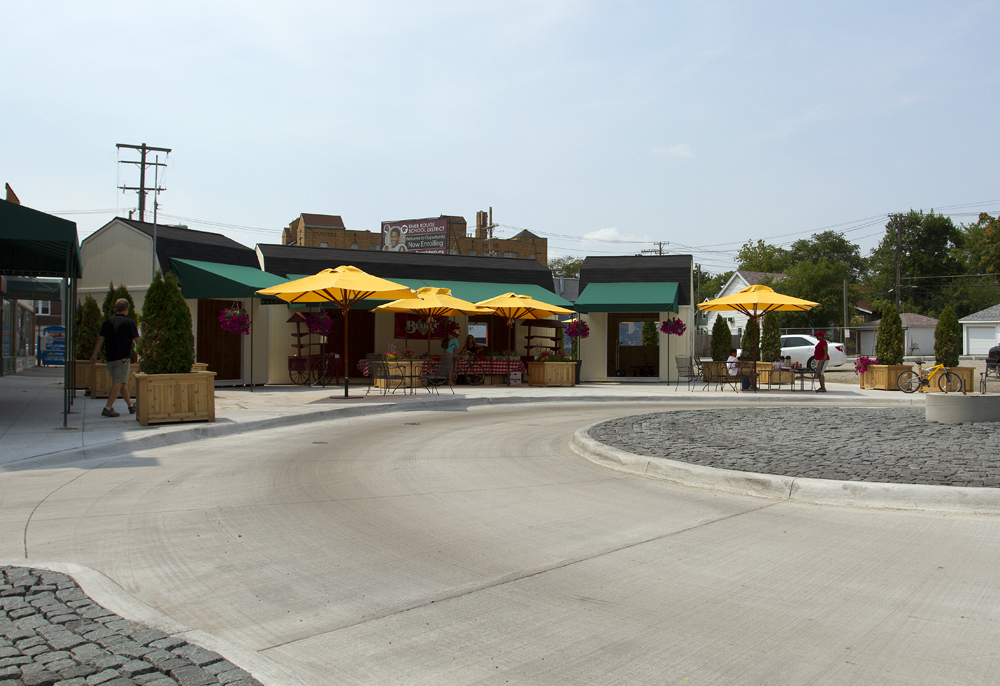Responding to public outcry over Grosse Pointe Park’s closed-door decision to block off a main road at the border of Detroit this summer, the suburban government’s top officials pledged to remove the controversial barricade by November in a promising agreement with Mayor Mike Duggan.
But today, eight days after the deadline, Grosse Pointe Park has still failed to remove the market’s sheds and reopen the intersection at Alter and Kercheval. Many residents of the affluent suburb are outraged by the community’s dismissive attitude about the Aug. 18 agreement and want the blockade removed immediately.
Under the threat of legal action by the Duggan administration, Mayor Heenan and Mayor Pro Tem Gregory Theokas agreed to move the sheds and reopen Kercheval at Alter.
“This collaborative effort will result in our creating a seamless transition between Detroit and Grosse Pointe Park,” Mayor Pro Tem Theokas said at the time.
Detroit has held up to its end of the deal and began removing abandoned buildings and other blight.
Now a growing number of Grosse Pointe Park residents are calling on the government to tear down the sheds and will let city council members know about it during the regular public meeting tonight at 7 p.m. on the fourth floor of the Municipal Office Complex at 15115 E. Jefferson Ave.
It remains unclear why Grosse Pointe officials have not removed the sheds yet and opened the street because they don’t return calls, and they often keep the public in the dark.
A Freedom of Information Act request reveals the city spent $175,000 on the farmer’s market without ever putting the issue up to a city council vote, as required by the city’s charter.
When Grosse Pointe Park resident Graig Donnelly complained about the process earlier this year during a public meeting, the mayor responded, “You ought to be grateful you live here.”
“They’re not responding to the residents,” Donnelly, who is hoping for a big turnout tonight, told me. “We are going to tell them to tear down the sheds. The sheds are not in the best interest of the people who live and work here.”
Opponents say the sheds represents an ugly time in Grosse Pointe’s history when black people were prevented from buying homes until the 1960s and were regularly prevented from crossing the border by roadblocks and fences. To this day, 10 roads at the border of the disparate cities are still blocked off or obstructed.
Mayor Palmer Heenan, who is 92 and represents the conservative side of the community, has threatened to renege on the agreement with Detroit after facing off with opponents. We revealed in July that a portion of the sheds were built on Detroit property, which would require approval from both cities.
Detroit’s population is about 82% black. Grosse Pointe’s is 85% white, but the number of African Americans moving to the community is on the rise. The Park also is the most progressive of the Pointes communities and even elected President Obama in 2008 and 2012.
Since we exposed Grosse Pointe Park cops for producing and circulating cell phone videos that poked fun at a schizophrenic black man, a diverse group of residents began meeting to look for solutions to decades of racism.
The group, Diverse GP, is holding a public workshop at 2 p.m. Saturday at Salem Church on Moross between I-94 and Mack to discuss ways to improve racial relations in schools, governments and communities.
“We are trying to set a good example of the right way to do things,” Donnelly, a leader of the group, told me.
We are awaiting a response from Detroit’s attorneys on the Park’s failure to meet the deadline to remove the shed.
Steve Neavling
Steve Neavling lives and works in Detroit as an investigative journalist. His stories have uncovered corruption, led to arrests and reforms and prompted FBI investigations.


55 Responses to "Grosse Pointe Park misses deadline to remove controversial blockade at Detroit border"